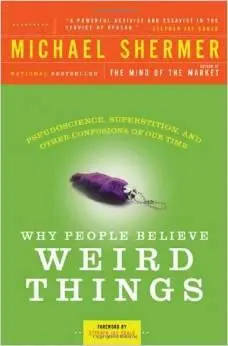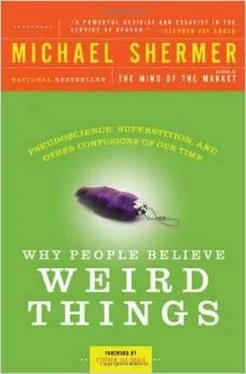Michael Shermer. Why People Believe Weird Things: Pseudoscience, Superstition and Other Confusions of Our Time

Why People Believe Weird Things provides an overview of the most common pseudoscientific and supernatural theories. It’ll teach you why so many people believe in them, why they’re wrong, and what methods proponents of pseudosciences use to assert their incorrect theories. It also offers both rational arguments for science, and rational arguments againstpseudoscience.
What’s in it for me? Learn about the strange things people believe in, and why.
Superstition and belief in supernatural phenomena are by no means left in the past. Even today, people believe in a wide range of absurd things, such as divination, creationism or alien abductions. Some of these things may induce nothing worse than weary head shakes, and some can actually be dangerous. Why do these pseudosciences persist? Why do people believe in them?
Why People Believe Weird Things attempts to answer these puzzling questions. In these blinks, you’ll learn about some of the most commonly held pseudoscientific “theories,” and the irrational arguments their proponents use to back them up. You’ll learn what makes pseudosciences so different from actual sciences, and how to tell the difference between them. You’ll also learn
how you can become a psychic in just a few minutes;
why the human wish for immortality will likely remain just a dream;
why the “tunnel” seen by people who have near death experiences is biological.
Science is based on facts – pseudoscience is based on belief.
What separates real science from pseudoscience? Pseudosciences like astrology or creationism claim to be “scientific,” but they actually reject scientific laws and methods.
Science is based on laws that can be measured. A scientific law describes an action in nature that can be proved by tests. Once we’ve determined a certain law, we can use it as a basis for further theories and research.
Consider the law of gravity. We can test it again and again, and confirm that it’s always true. Scientists can research the physical world further, knowing that the law of gravity will always be a part of it.
A scientific theory can also be tested, but it’s different from a law, because it’s possible to prove a theory wrong. The fact that theories don’t have to be correct is actually one of science’s greatest strengths. Anyone can research a theory, and correct and improve it if necessary.
Pseudoscientific theories, however, aren’t based on facts. They’re based on belief, which also means they can’t be proven wrong, because you can’t disprove someone’s subjective belief.
Unlike science, pseudosciences don’t involve any sort of laws or evidence. Instead, they’re based on intangible ideas or assumptions.
Divination, for instance, is based on the assumption that certain people have innate psychic powers. Yet throughout human history, no one has ever been able to prove that psychic powers exist. Because divination isn’t based on evidence, it can’t be tested.
Ultimately, pseudosciences can never be proven wrong – or right – which is where they differ from science. A scientist would say, “x is true because I can prove that x is true,” whereas a pseudoscientist would say, “x is true because you can’t prove that x is wrong.”
Scientific knowledge always grows and improves, whereas pseudosciences are static.
Since the dawn of humanity, scientific knowledge has been growing – and growing rapidly. Over the millennia, people have researched, tested and improved scientific ideas, so that our understanding of science is always increasing.
Each new scientific theory is based on the current body of knowledge. If a theory gets replaced by a newer one, we can still retain the useful information from it.
If a scientist can prove a theory wrong, they’ll offer a better one, and they certainly don’t have to abandon the rest of scientific knowledge. This means that science is always correcting itself, as people filter out the good and bad ideas, and replace the bad ones.
This happened when Darwin created his theory of evolution, which replaced the theory of special creation – the belief that the universe was made by God. Darwin’s theory included a great deal of earlier scientific knowledge, such as anatomy and geology.
Unlike science, pseudosciences don’t progress. Pseudoscientific theories are static because they’re based on belief – if you doubt one element it means you have less than total faith, which invalidates the whole thing. These kinds of beliefs can’t be tested or improved.
Creationism is a poignant example of this. Creationists try to put a scientific gloss on their beliefs, but if creationism were a true science, creationists would either have to successfully dismiss Darwin’s theory of evolution with empirical evidence (which they’ve failed to do), or accept it. And of course, they can’t accept it, because if they did they’d have to admit the Bible is wrong. So creationism can’t claim any scientific rigor for itself.
Pseudosciences have little in common with actual science. Nonetheless, many people continue to believe in them. In the following blinks, we’ll examine some common supernatural beliefs, and why they’re wrong.
Divination isn’t magical – it’s simply guess work, close observation and research.
If you watch a mind reader or psychic at work you might be surprised at the accuracy of their information. Accurate readings, however, don’t mean that divination is real. Psychics use tricks to fool their audience into believing them, just like magicians.
There are two methods that psychics or other mystical people use to fool people into believing them.
The first is to give a cold reading, in which a psychic tries to guess details about the person’s life, which is actually fairly easy if the guesses are vague enough.
The psychic will first ask some general questions until they find a topic the subject responds to positively, at which point the psychic goes into more detail, probing further. For example, the psychic might start out with, “Do you have problems in your relationship?” If they keenly observe how their client reacts verbally and physically to leading questions, they can make further educated guesses about their personal life and situation.
These mind readers also understand it’s alright if they get a few things wrong, because the client will remember the hits much better than the misses. Fortune tellers also usually try to keep it positive, by saying things like “You’ll find your true love soon.”
In a hot reading, a psychic researches their client’s life ahead of time. They’re especially likely to do this before a show, because they want to make a good impression on viewers.
Psychics will often arrange informal meetings with certain spectators before a performance. It may seem harmless, but it’s actually a good opportunity for the psychic to get personal information about people through small talk, then use it to wow the audience later.
Nowadays, hot readings are even easier because so many people share their personal information online. In many cases, all it takes to be a “psychic” is access to someone’s Facebook or Instagram.
Near death experiences are purely biological, and can be explained.
It’s a marvel of modern medicine that many people survive severe accidents or life-threatening comas where they technically “die,” but there’s still some mystery: many of these survivors report the same experience. They say they felt they were leaving their body, and moving through a tunnel toward a light.
Читать дальше













